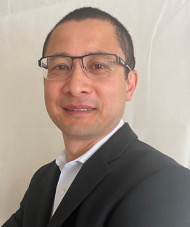Buchs (SG), Switzerland |
 Dr. Tri Tuladhar  Trijet Limited, United Kingdom |
Differentiating jetting & non-jetting inkjet inks using complex rheological tools
Abstract :
The complex dynamic properties of ink is one of the key parameters that affect the whole ink jet process and jetting behaviour. Optimising bulk properties of inkjet inks to printhead specifications during formulation alone are no guide to achieving reliable jetting. During jetting, the ink encounters all forms of extreme rheology - (i) high frequency (~ 100 kHz) in the printhead channel during waveform actuation, (ii) high shear rate (~ 106 s -1 ) at the nozzle during drop ejection and (iii) extreme in-flight filament stretching before jet break up.
Any minor changes in the ink components or batch variations of formulation can drastically change linear high frequency viscoelastic properties of inks in in printhead channel during waveform actuation and subsequent in-flight non-linear extensional viscoelastic properties of the ink during ejection. This has direct influence on printhead pumping capacity for drop ejection, in-flight jetting & break-up behaviour, meniscus damping profile post jetting and ink channel re-filling capability.
As the inkjet industries explore jetting novel functional materials with relatively high viscosity and high solid loadings inks, we find only limited inks jet reliably well, whereas many others with similar bulk properties fail miserably.
We will present complex rheological tools and techniques to characterise inkjet inks dynamic properties at the timescale and geometry relevant to inkjet system that can identify and quantify subtle differences between good and bad inks. Understanding the influence of these dynamic properties of inkjet inks will aid formulating and fine-tuning reliable functional materials inkjet inks and speed up waveform development.
Any minor changes in the ink components or batch variations of formulation can drastically change linear high frequency viscoelastic properties of inks in in printhead channel during waveform actuation and subsequent in-flight non-linear extensional viscoelastic properties of the ink during ejection. This has direct influence on printhead pumping capacity for drop ejection, in-flight jetting & break-up behaviour, meniscus damping profile post jetting and ink channel re-filling capability.
As the inkjet industries explore jetting novel functional materials with relatively high viscosity and high solid loadings inks, we find only limited inks jet reliably well, whereas many others with similar bulk properties fail miserably.
We will present complex rheological tools and techniques to characterise inkjet inks dynamic properties at the timescale and geometry relevant to inkjet system that can identify and quantify subtle differences between good and bad inks. Understanding the influence of these dynamic properties of inkjet inks will aid formulating and fine-tuning reliable functional materials inkjet inks and speed up waveform development.
Bio :
Tri Tuladhar graduated in Chemical Engineering from RMIT, Australia and PhD in Chemical Engineering from the University of Cambridge, UK. He has over 20 years’ experience in R&D in academia and industry. Since 2005, he has focussed on complex rheology of inkjet printing ink and developed novel techniques to link fluid rheology to jetting behaviour.
Currently, he heads Trijet Limited, specialising in all aspects of inkjet printing: Inkjet ink characterisation and fine-tuning, formulation of speciality paints, glass enamels and functional inks, jetting optimisation and developing customised rheological tools for such applications.
Currently, he heads Trijet Limited, specialising in all aspects of inkjet printing: Inkjet ink characterisation and fine-tuning, formulation of speciality paints, glass enamels and functional inks, jetting optimisation and developing customised rheological tools for such applications.
